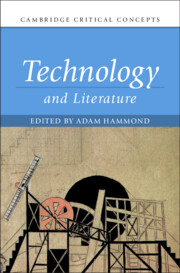Book contents
- Technology and Literature
- Cambridge Critical Concepts
- Technology and Literature
- Copyright page
- Contents
- Figures
- Contributors
- Timeline
- Introduction
- Part I Origins
- Part II Developments
- Chapter 8 Prostheses
- Chapter 9 Clocks
- Chapter 10 Compasses
- Chapter 11 Telescopes
- Chapter 12 Steam Engines
- Chapter 13 Wires
- Chapter 14 Cameras
- Chapter 15 Phonographs
- Chapter 16 Waves and Rays
- Chapter 17 The Bomb
- Chapter 18 Networks
- Part III Applications
- Index
Chapter 8 - Prostheses
from Part II - Developments
Published online by Cambridge University Press: 30 November 2023
- Technology and Literature
- Cambridge Critical Concepts
- Technology and Literature
- Copyright page
- Contents
- Figures
- Contributors
- Timeline
- Introduction
- Part I Origins
- Part II Developments
- Chapter 8 Prostheses
- Chapter 9 Clocks
- Chapter 10 Compasses
- Chapter 11 Telescopes
- Chapter 12 Steam Engines
- Chapter 13 Wires
- Chapter 14 Cameras
- Chapter 15 Phonographs
- Chapter 16 Waves and Rays
- Chapter 17 The Bomb
- Chapter 18 Networks
- Part III Applications
- Index
Summary
This chapter covers literary representations of prostheses in a wide range of historical periods to outline the difference that literature can make in challenging the dominant technological narrative and reframing it in terms of human uses. Taking as emblematic a pair of short stories by William Faulkner (“The Leg”) and Flannery O’Connor (“Good Country People”), Hall argues that these works do more than simply register shifts in prosthetic technology, but also challenge normalizing discourses through forms that “resist any urge toward stable order, whether narrative, social, or bodily.” “Language and storytelling are important to our understanding of prosthesis,” Hall argues, “because anxieties, hopes, and fantasies about enablement, modification, and enhancement, as well as the powerful fiction of the ‘normate,’ are reinforced but also renegotiated in literary and cultural spaces.”
- Type
- Chapter
- Information
- Technology and Literature , pp. 163 - 176Publisher: Cambridge University PressPrint publication year: 2023

